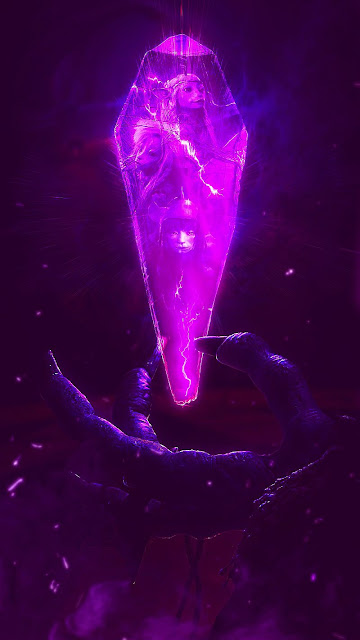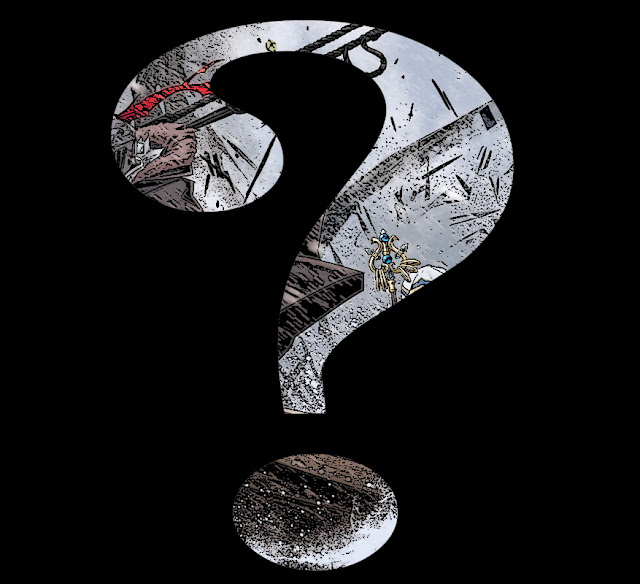The goal of this post is to show my Storybox approach to Adventure Design 'in action' by recounting an old campaign in which I used this method.
Before I get into it though, I want to say I'm a little surprised by the response to this or lack there of. I was really expecting more views and comments.
Sure, most would be of the 'have you lost your mind' sort of thing, followed by the 'what you describe would never work' variety. Instead...nothing so far.
Hmm. Perhaps people are just nodding their heads in agreement and understanding. Maybe what I am proposing isn't all that strange these days. Have I waited too long and now my off beat way of doing things is just the norm or worse yet...mundane? Good grief. I don't know that I could live that down.
Please, someone out there read from a boxed text or remind me how 'adventure paths' work.
To illustrate exactly how the Storybox method works, I will recount one of the first campaigns I can remember where I consciously used this approach. It was a homebrew Star Wars campaign from back in 1985-86. The campaign never received a title but was jokingly referred to for years as the 'Forcepunk' campaign.
The game featured a view of the Star Wars universe from the average citizen of the Galaxy instead of the big heroes and villains of the war between the remnants of the Imperial Empire and the New Republic. It also had a bit of dark humor.
Now let's break it down Storybox style:
The Premise: A Star Wars campaign focused on a group of misfits trying to survive in the aftermath of the Emperor's death and the fall of the Galactic Empire. The New Republic has been established but things aren't going all that smoothly on the frontier (what we now call The Outer Rim Territories)
The Map*: The map is mostly concerned with Hutt Space and independent worlds beyond the reach of the New Republic and the Imperial Remnants; the latter being small groups of Empire holdovers serving as regional warlords or trying to pretend the Imperials are still in charge.
Star systems noted with a blue star are ones from Star Wars canon. Those with yellow stars are original locations created by me. The PCs were free to travel anywhere they wanted with the limitations of having the Hyperspace Coordinates, time, fuel*, and the like.
Most of the campaign ended up with the PCs traveling to many worlds but often bouncing back and forth between Gardine**, Tatooine, and ZellZell. They would do jaunts to worlds as far away as Corellia, Mandalore, and Ord Mantell but then head back 'home' to their base of sorts on Gardine.
Of special note is Kolindoor, identified on the map with a blue ring around the yellow star. This planet was not originally on the map. Its coordinates were obtained by the PCs after a new PC joined and the others helped him obtain it from hidden ruins on Mandalore.
Conceits: The prevailing themes of the campaign were as follows...
The PCs were bad people ashamed or tired of being bad. They sought redemption.
They were good at being bad but sort of bad at being good.
The campaign's take on The Force was that it was much like Karma.
The Opening:
The campaign opened with the PCs, a group of Gangsters, and a group of Imperials in a firefight on the planet Ord Itani. I made references to a deal, a botched job, a double cross, and a desperate squad of Imperials swooping in to claim the prize.
Improvised dialogue between the Players/PCs filled in the details. The Gangsters hired the PCs to get Spice from Kessel. Imperials showed up so the PCs dumped their cargo and the Imperials found nothing. The PCs never dumped anything; it was a trick. They reached Ord Itani and gave the Spice to the Gangsters but the Imperials followed the PCs there and demanded the shipment. The Gangster refused to pay the PCs since they brought the Imperials to them.
Blaster fire and chaos ensued.
PC party splits up. Three hold off the enemies with blasters, smoke bombs, and some neat tricks using the environment of the jungle spaceport. Two sneak off to the docking bay where their ship is to get it ready to leave. One steals a Speeder Bike and attempts to nab some of the Spice.
A bit later, the ship flies right over head and picks up the rest of the party. The guy on the Speeder Bike gets one case of Spice and drives the cycle into the PC freighter's cargo hold. One PC manages to get the Imperials and Gangsters shooting each other more than they shoot the PCs. Still and all, two of the PCs are badly wounded.
Escaping into space, the freighter is soon pursued by Gangster ships and TIE Fighters. The players ask me where they should jump to next.
This is key. I said, "I don't know. It's your ship. Where do you want to go?"
Absorbing this, the PCs check their Nav Computer to see what's near by and what are these places like. They decide to go to Gardine, an original planet not far from Tatooine. It is independent of the Hutts and a good place to lay low because its largely unpleasant and few want to go there (heheh). The PCs eventually find Gardine so cool they make it their unofficial base of operations.
Onward:
While they start off as low lives and ne'er do wells (except for the Jedi Wannabe who joins later), the PCs play out the idea that this isn't what they want. In fact, many of them are trying to leave that lifestyle behind and do some good. Others don't know any other way to be. As the campaign progressed, the PCs went from smuggling Spice and taking on underworld bounties to trying to protect alien refugees and turning the Gangsters of Ord Itani in to the New Republic.
As is the nature of my Storybox philosophy, the PCs would ask around once arriving on a planet and find out the local goings on. One world might be the domain of a interstellar kingpin but also noted for a rare fruit and offering a bounty on illegal poachers. There were always multiple things happening on a given planet. Add to these hooks and leads whatever it was the players were looking to do.
Thoughts:
I never quite knew what the next game session would bring though and neither did they. Although I had laid out all the current politics and happenings, made notes on each of the planets and their inhabitants, I had no idea which of these would see the light of day until the PCs decided to go there.
In one session I'll never forget, the PCs find out that their 'change of heart' activities have them wanted by several figures of the Galactic Underworld. One of the bounty hunters after them is rumored to be Boba Fett, even though the PCs had heard Fett died three years ago on Tatooine.
Anyway, this event was supposed to be part of the living background, a little crumb to be explored at some later point. One of the PCs, the one with the highest bounty on his head, decided the group needed to do something about this right away. With the help of his companions the PC enacted a brilliant plan; he appeared to blow himself up in his landspeeder, left one identifying piece behind, then disguised himself as a different bounty hunter and turned it in to collect the bounty - ON HIMSELF!
This scenario was the culmination of numerous previous events and pro-actively initiated by a player. I like to believe myself pretty creative but there is no way I saw that coming. Is that going to happen in anyone's pre-written adventure? Is there a way to pencil in room to have that happen? I mean, it's possible but I don't recall a lot of that kind of thing coming up in the Village of Hommlet or Griffin Mountain. Again, it could happen but generally the way most adventures are created and structured there doesn't seem to be room for the kind of pro-active, player driven narratives seen in this more open-ended method.
For me, this improvisation-with-parameters or perhaps improvisation-with-provided-tools approach works much better than the more traditional version of adventure design.
With that, I think I will end my analysis of this idea and move on to something else. November is almost upon us and I want to consider what I am going to talk about next month and perhaps beyond...
AD
Barking Alien
*We never actually addressed fuel beyond being out of it or needing to get it. A botched Navigation or other flight based roll could have me saying, "Seems you burned a lot of fuel this trip" or "Your low on fuel after that last jump". Fuel was more of a MacGuffin than a tracked resource.
**I have mentioned Gardine (pronounced gar-DEEN) before. It is one of my oldest original planets. It is also nearly identical to the planet Nevarro that appears in The Mandalorian streaming series from Disney+. From the ash covered landscape to the lava rivers and the presence of Offworld Jawas it is startling how similar Nevarro and Gardine are.



















